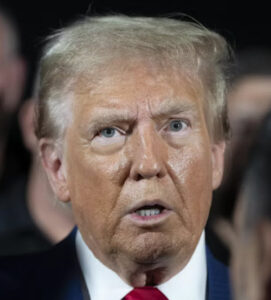
Are Republican’s Trying to Coverup Trump’s Early Signs of Dementia?
Several speech and cognitive experts have noted changes in Trump’s communication style over recent years. Analyses have highlighted patterns such as increased tangentiality, simplified sentence structures, and repetitive language, which some experts suggest could be indicative of cognitive decline. For instance, a study comparing Trump’s recent speeches to those from earlier years found a decrease in linguistic complexity and coherence.
Additionally, Dr. Jennifer R. Mercieca, a rhetoric expert, has pointed out that Trump’s unscripted speeches often appear disorganized and digressive, potentially signaling cognitive issues . Dr. John Gartner, a psychologist and founder of the “Duty to Warn” group, has also expressed concerns, suggesting that Trump’s behavior exhibits signs consistent with dementia
The eighth round of Trump's humiliation, Trump surprised announced that he was going to leave early after dinner with the leaders. A visibly defeated Trump boarded the plane after achieving little to nothing at the #G7.
— Anonymous (@youranoncentral.bsky.social) June 17, 2025 at 2:48 AM
[image or embed]
The real reason Trump abruptly left the G7 Summit. 👇
— Hoodlum 🇺🇸 (@nothoodlum.bsky.social) June 16, 2025 at 6:55 PM
[image or embed]
Canada PM Carney stops Trump from going into one of his signature fascist rants against "blue" cities: "Let me exercise my role as G7 chair" #G7
— Anonymous (@youranoncentral.bsky.social) June 16, 2025 at 1:58 PM
[image or embed]
White House Refused to Release Medical Trump’s Media Records
Where is the transparency?
While there is no formal medical diagnosis confirming cognitive decline, the observations by experts, public opinion, and behavioral analyses contribute to ongoing discussions about Trump’s mental fitness. As with any public figure, especially one in a position of leadership, transparency and comprehensive health evaluations are essential to address and clarify such concerns.
The White House has not released former President Donald Trump’s full medical records primarily because Trump has chosen to withhold them. Under U.S. law, medical information is protected by privacy regulations, and disclosure is at the discretion of the individual. Throughout his political career, Trump has consistently opted for minimal transparency regarding his health.
Demential Issues in the Trump Family History
Public opinion reflects these concerns to some extent. Polls conducted during the 2024 election cycle indicated that a significant portion of voters questioned Trump’s mental acuity and transparency regarding his health . Notably, Trump’s nephew, Fred C. Trump III, publicly expressed worries about his uncle’s cognitive health, drawing parallels to their grandfather’s battle with Alzheimer’s disease.
Fred emphasizes a pattern of dementia within the Trump family. He cites his grandfather, Fred Trump Sr., who was diagnosed with Alzheimer’s disease, and mentions that other relatives, including Donald Trump’s sister Maryanne Trump Barry and cousin John Walter, showed signs of cognitive decline. Fred expresses concern that Donald Trump may be experiencing similar issues, stating, “I know what I saw in my grandfather… I know what I saw in Donald’s older sister”.
While Fred C. Trump III’s observations are personal and not medical diagnoses, they contribute to ongoing public discourse regarding Donald Trump’s cognitive health. These concerns are echoed by some experts and commentators, though they are strongly contested by Trump and his supporters. As the former president continues to be a prominent political figure, discussions about his mental fitness remain a topic of interest and debate.

Leave a Reply